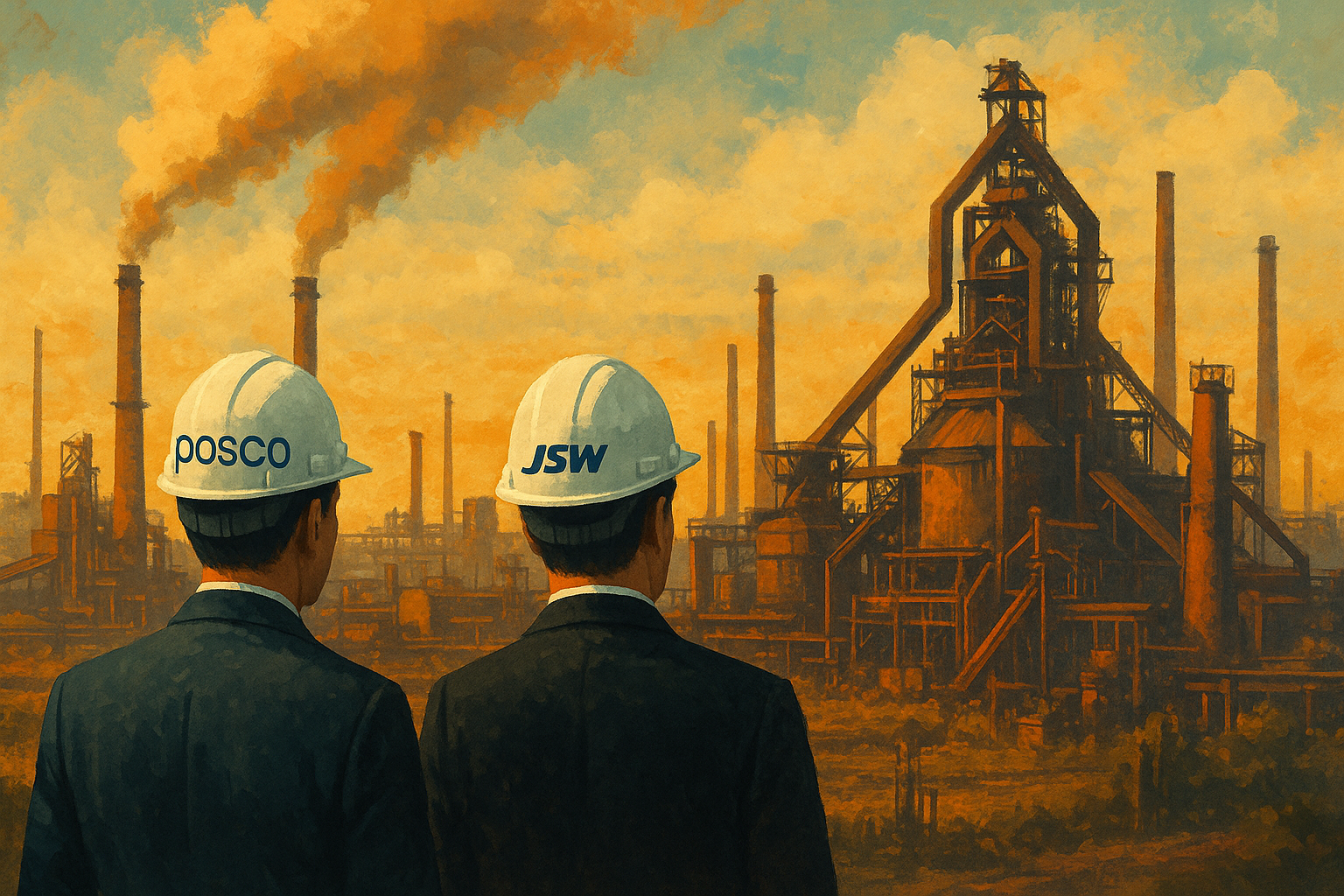South Korea’s steel giant POSCO Holdings is making yet another attempt to enter India’s steel market—this time in partnership with JSW Steel, the country’s largest steel producer. The two companies announced plans to jointly build a 6 million tonne per annum (mtpa) integrated steel plant, likely in Odisha, a state that has already played host to POSCO’s earlier, but unsuccessful, India ventures.
A $9 Billion Bet on India’s Steel Future
While the companies did not disclose financial details, industry executives revealed that the joint venture could see investments of ₹70,000–80,000 crore ($8–9 billion). A 900-acre land parcel that JSW Steel had acquired earlier this year in Odisha, close to Cuttack, Paradeep Port, and mineral-rich belts, may serve as the project site.
The plant is not merely about scale—it also embodies ambition. Beyond conventional steelmaking, JSW and POSCO plan to collaborate in two future-facing sectors: battery technology for electric vehicles and captive renewable power generation to support steel operations.
Why Odisha Again?
POSCO’s history in India is deeply tied to Odisha. In 2005, it proposed a massive $12 billion project in the state, which would have been one of the largest FDI projects in India. But after a decade-long struggle over land acquisition, environmental clearances, and local protests, POSCO withdrew in 2017. A similar attempt in Karnataka in 2010 also failed.
This time, the partnership with JSW Steel is seen as a strategic move to overcome those hurdles. JSW brings local expertise, a vast land bank, political goodwill, and efficient project execution experience—elements that POSCO lacked in its earlier solo efforts.
A Partnership of Strengths
For JSW, the deal offers a technological edge. POSCO is known globally for its advanced steelmaking techniques, particularly in producing high-value steels such as grain-oriented and non-grain-oriented electrical steels and other niche alloys—products that India currently imports. A joint venture could localize production of these critical materials, strengthening India’s supply chains.
For POSCO, the benefits are equally clear. India is one of the few bright spots in global steel demand, growing steadily despite global slowdowns. By producing locally, POSCO can tap into this demand directly while avoiding import duties India levies on foreign suppliers.
As Suman Kumar of Dolat Capital explained, “Even with a 50:50 JV, POSCO would secure half of the incremental earnings, making the venture financially attractive.”
Market Reaction and Industry Implications
The announcement immediately boosted investor confidence. JSW Steel’s stock jumped 3.68% on the NSE, outperforming the benchmark Nifty 50, which rose 1%.
Industry analysts see this venture as a win-win. JSW’s ability to build projects efficiently at low cost, combined with POSCO’s technology, could reshape India’s steel landscape. Parthiv Jhonsa of Anand Rathi Institutional Equities suggested that the collaboration in steel, battery technology, and renewable power would cement both companies’ leadership in the market.
India’s steel output has grown nearly four-fold since POSCO’s first entry attempt in 2005, when JSW produced just 1.88 mt against Tata Steel’s 4.10 mt. Today, JSW is the leader with 27.79 mt out of India’s total 151.1 mt production in FY25. With the Union steel ministry targeting 300 mtpa capacity by 2030, this partnership is well aligned with national goals.
Lessons from the Past
POSCO’s earlier exits were painful reminders of how challenging India’s regulatory and social environment can be. In Odisha’s Jagatsinghpur district, its mega-project was derailed by local opposition and regulatory gridlocks over land and mining rights. The Korean major eventually wound down operations in India in 2017.
But this time may be different. By tying up with JSW, POSCO gains an anchor with political, operational, and market clout. Observers are cautiously optimistic—yet they warn that execution challenges remain.
Looking Ahead
POSCO’s India story has been one of promise, setbacks, and resilience. Its renewed partnership with JSW Steel could finally unlock its ambitions in the world’s fastest-growing steel market. If successful, the 6 mtpa plant could mark not just POSCO’s entry but also a transformation in India’s steel industry by marrying global technology with domestic strength.
As POSCO’s president Lee Ju-tae aptly put it, “India is central to the future of global steel demand. This initiative represents our commitment to supporting India’s industrial growth while creating long-term value for both organizations.”
Third time may truly be the charm.
Feel free to share your experiences and insights in the comments below. Let’s continue the conversation and grow together as a community of traders and analysts.
By sharing this experience and insights, I hope to contribute to the collective knowledge of our professional community, encouraging a culture of strategic thinking and informed decision-making.
As always, thorough research and risk management are crucial. The dynamic nature of financial markets demands vigilance, agility, and a deep understanding of the tools at your disposal. Here’s to profitable trading and navigating the election season with confidence!
Ready to stay ahead of market trends and make informed investment decisions? Follow our page for more insights and updates on the latest in the financial world!
For a free online stock market training by Yogeshwar Vashishtha (M.Tech IIT) this Saturday from 11 am – 1 pm, please sign up with https://pathfinderstrainings.in/training/freetrainings.aspx
Experience profits with my winning algo strategies – get a free one-month trial with ₹15 lakh capital! – https://terminal.algofinders.com/algo-terminal
Disclaimer
This article should not be interpreted as investment advice. For any investment decisions, consult a reputable financial advisor. The author and publisher are not responsible for any losses incurred by investors or traders based on the information provided.


